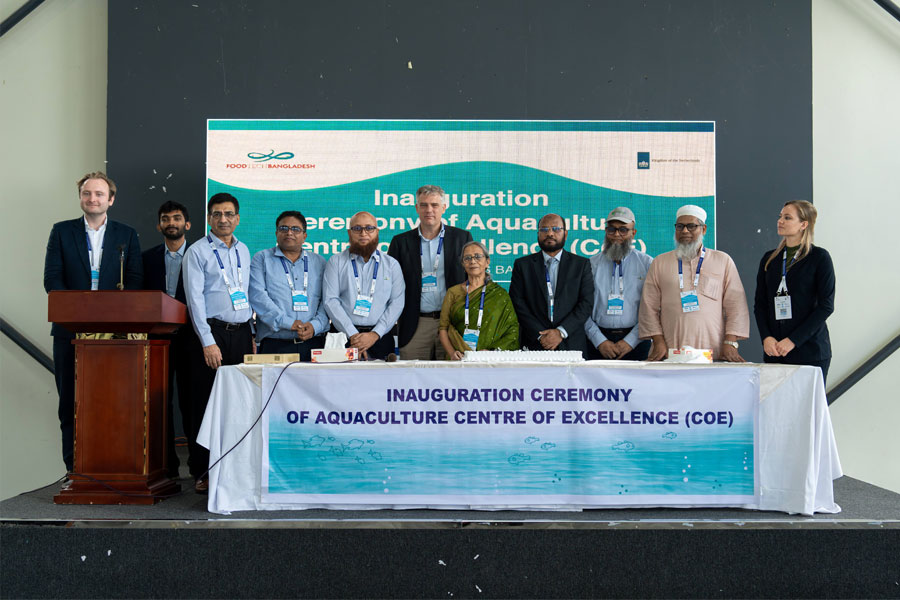Netherlands govt commits long-term support to sustainable fisheries development in Bangladesh

Published :
Updated :

The Government of the Netherlands has pledged to continue its long-term support to Bangladesh for the sustainable development of its fisheries sector.
Joris van Bommel, Ambassador of the Netherlands to Bangladesh, reaffirmed this commitment at the recent inauguration of the In-Pond Raceway System (IPRS), a modern and eco-friendly aquaculture technology held at a hotel in Cox’s Bazar, according to a media release.
Speaking at the event, Joris van Bommel, Ambassador of the Kingdom of the Netherlands to Bangladesh expressed interest in strengthening collaboration with Bangladesh, particularly through investment in agriculture and aquaculture.
The inauguration ceremony was attended by Farida Akhter, Adviser to the Ministry of Fisheries and Livestock, who formally launched the IPRS technology as the chief guest.
The In-Pond Raceway System (IPRS) is an innovative and automated aquaculture method that enhances water management efficiency in fish farms. Unlike conventional systems, IPRS does not require full water changes. Instead, water is continuously circulated and purified within the pond, maintaining optimal environmental conditions for fish cultivation.
The system collects waste separately, preventing it from contaminating the water and allowing it to be repurposed as fertiliser. Suitable for both ponds and enclosed farms, IPRS offers a more sustainable and resource-efficient approach to aquaculture.
With appropriate training, fish farmers in Bangladesh can easily adopt this technology, paving the way for a more productive and sustainable aquaculture sector. While IPRS is already being used successfully in several countries around the world, its uptake in Bangladesh remains limited. However, experts believe that greater adoption of this technology could represent a significant leap forward in increasing productivity of the sector.
The IPRS initiative, implemented with FishTech BD Ltd., is part of the FoodTechBangladesh programme, a public-private partnership co-funded by the Netherlands Government. The programme is being implemented jointly by Larive International and the consultancy firm LightCastle Partners, with the aim of strengthening sustainable aquaculture in Bangladesh. Key objectives include: Establishing Centres of Excellence (CoEs) across the country to build capacity among fish farmers; Introducing innovative technologies to enhance productivity; and creating inclusive economic opportunities for small-scale fish farmers. The initiative seeks to make the sector more resilient and inclusive, supporting long-term development through sustainable practices.
The inauguration event was attended by key stakeholders, including: Dr Md. Abdur Rouf, Director General, Department of Fisheries; Jordi Dreiteller, Export Director (Asia), De Heus, Representatives from LightCastle Partners and other relevant organisations
Farida Akhter underscored the importance of leveraging IPRS technology to increase fish stocking density and overall national aquaculture output. She stressed the need to ensure that small-scale farmers can benefit from such technological advancements.
Dr Md. Abdur Rouf also emphasised the importance of scaling up the use of IPRS technology to support sustainable growth and efficiency in the fisheries sector.
The fisheries sector is a vital contributor to Bangladesh’s economy and plays a significant role in food security, employment, and export earnings. In the 2022–2023 fiscal year:
The sector contributed approximately 2.53% to the national GDP. It accounted for about 22.26% of the agricultural GDP, and around 20 million people are directly or indirectly dependent on it for their livelihoods.
Bangladesh has established itself as a leading fish-producing country globally. In this context, the adoption of environmentally sustainable technologies like IPRS is being hailed as a transformative step towards future-proofing the sector, the release adds.


 For all latest news, follow The Financial Express Google News channel.
For all latest news, follow The Financial Express Google News channel.